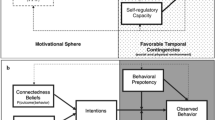Abstract
Two studies were conducted to develop and evaluate the usefulness of self-efficacy and outcome expectation measures in predicting smoking status. Subjects were chronic smokers participating in controlled smoking treatment programs. In Study 1, Self-Efficacy and Outcome Expectancy Scales were developed and used to concurrently predict nicotine content, amount of each cigarette smoked, number of cigarettes smoked, and carbon monoxide levels. Both congruence microanalyses and correlational analyses revealed a strong relationship between self-efficacy and the dependent variables. Study 2, a larger prospective study, found strong correlations between our revised Self-Efficacy Scale and smoking behavior at a 6-month follow-up. In neither study did outcome expectancy significantly correlate with the dependent variables, nor did it significantly increment the proportion of variance explained when combined with self-efficacy.
Similar content being viewed by others
References
Bandura, A. (1977).Social learning theory. Englewood Cliffs, New Jersey: Prentice-Hall.
Bandura, A. (1978). Reflections on self-efficacy.Advances in Behaviour Research and Therapy, 1 237–269.
Bandura, A. (1980). Gauging the relationship between self-efficacy, judgment, and action.Cognitive Therapy and Research, 4 263–268.
Bandura, A. (1982). Self-efficacy mechanism in human agency.American Psychologist, 37 122–147.
Barling, J., & Abel, M. (1983). Self-efficacy beliefs and tennis performance.Cognitive Therapy and Research, 7 265–272.
Condiotte, M., & Lichtenstein, E. (1981). Self-efficacy and relapse in smoking cessation programs.Journal of Consulting and Clinical Psychology, 49 648–658.
Davis, F. W., & Yates, B. T. (1982). Self-efficacy expectancies versus outcome expectancies as determinants of performance deficits and depressive affect.Cognitive Therapy and Research, 6 23–35.
DiClemente, C. C. (1981). Self-efficacy and smoking cessation maintenance: A preliminary report.Cognitive Therapy and Research, 5 175–187.
Glasgow, R. E., & Bernstein, D. A. (1981). Behavioral treatment of smoking behavior. In L. A. Bradley & C. K. Prokop (Eds.),Medical psychology: A new perspective. New York: Academic Press.
Glasgow, R. E., Klesges, R. C., Godding, P. R., & Gegelman, R. (1983). Controlled smoking, with or without carbon monoxide feedback, as an alternative for chronic smokers.Behavior Therapy, 14 386–397.
Glasgow, R. E., Klesges, R. C., Godding, P. R., Vasey, M. W., & O'Neill, H. K. (1984). Evaluation of a worksite controlled smoking program.Journal of Consulting and Clinical Psychology, 52 137–138.
Hughes, J. R., Fredericksen, L. W., & Frazier, M. (1978). A carbon monoxide analyzer for measurement of smoking behavior.Behavior Therapy, 9 293–296.
Jacobson, N. S., & Baucom, D. H. (1977). Design and assessment of nonspecific control groups in behavior modification research.Behavior Therapy, 8 709–719.
Kirsch, I. (1980). “Microanalytic” analysis of efficacy expectations as predictors of performance.Cognitive Therapy and Research, 4 259–262.
Kirsch, I., & Wickless, C. V. (1983). Concordance rates between self-efficacy and approach behavior are redundant.Cognitive Therapy and Research, 7 179–188.
Lichtenstein, E. (1982). The smoking problem: A behavioral perspective.Journal of Consulting and Clinical Psychology, 50 804–819.
Manning, M. M., & Wright, T. L. (1983). Self-efficacy expectancies, outcome expectancies, and the persistence of pain control in childbirth.Journal of Personality and Social Psychology, 49 421–431.
Mausner, B. (1973). An ecological view of cigarette smoking.Journal of Abnormal Psychology, 115–126.
McFall, R. M. (1978). Smoking cessation research.Journal of Consulting and Clinical Psychology, 46 703–712.
National Clearinghouse on Smoking and Health. (1975).Smoker's self-testing kit (DHEW Publication No. (CDC) 75-8716). Washington, D.C.: U.S. Government Printing Office.
Pechacek, T. F. (1979). Modification of smoking behavior. InSmoking and Health: A Report of the Surgeon General (DHEW Publication No. (PHS) 79-50066, pp. 19(1)-19(63). Washington, D.C.: U.S. Government Printing Office.
Rollnick, S., & Heather, N. (1982). The application of Bandura's self-efficacy theory to abstinenceoriented alcoholism treatment.Addictive Behaviors, 7 243–250.
U.S. Public Health Service. (1979). InSmoking and Health: A Report of the Surgeon General (DHEW Publication No. (PHS) 79-50066). Washington, D.C.: U.S. Government Printing Office.
Author information
Authors and Affiliations
Additional information
This study was conducted as part of the requirements for a master's thesis for the first author from North Dakota State University. Appreciation is expressed to members of the thesis committee (chaired by the second author): Bill Beatty, Nancy Bologna, Pat Halvorson, and Bob Klesges, and also to Kit O'Neill and Mike Vasey, who served as therapists and assisted in data analyses. Study 2 was supported in part by grant No. 30615 from the National Heart, Lung, and Blood Institute.
Rights and permissions
About this article
Cite this article
Godding, P.R., Glasgow, R.E. Self-efficacy and outcome expectations as predictors of controlled smoking status. Cogn Ther Res 9, 583–590 (1985). https://doi.org/10.1007/BF01173011
Issue Date:
DOI: https://doi.org/10.1007/BF01173011



